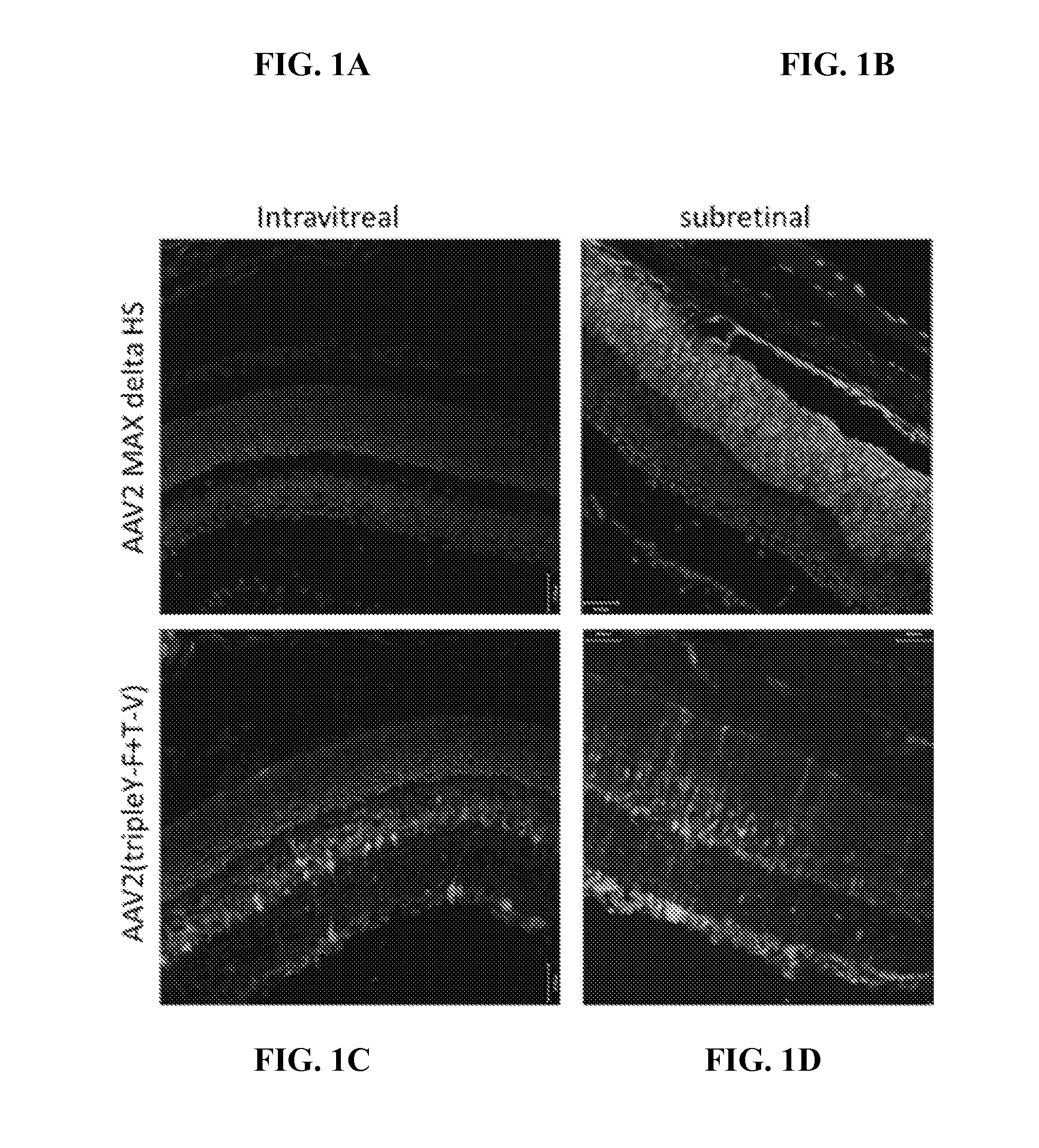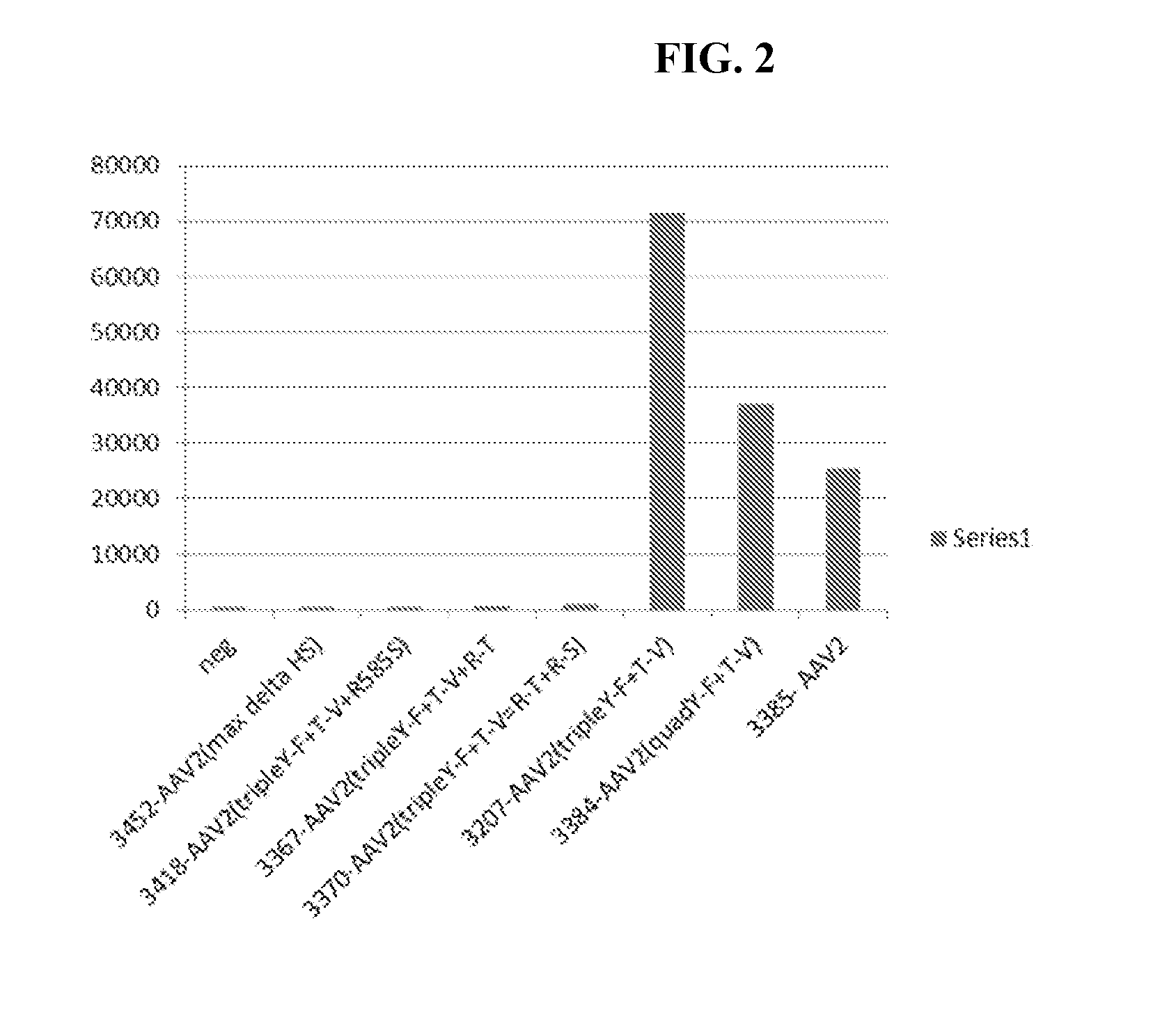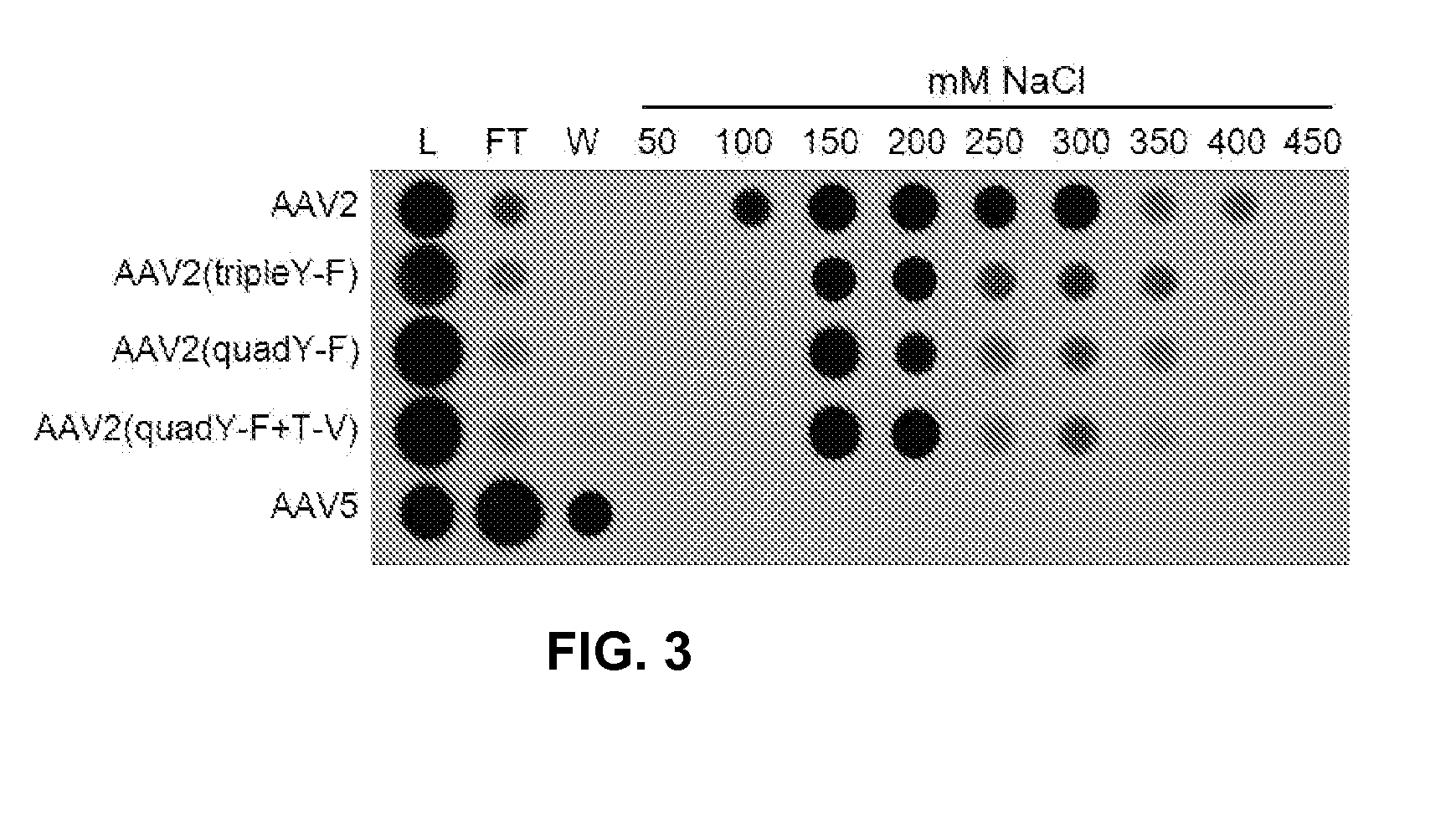Improved raav vectors and methods for transduction of photoreceptors and rpe cells
a technology of photoreceptors and vectors, applied in the field of molecular biology and virology, can solve the problems of limiting the usefulness of certain gene therapy regimens, and achieve the effects of improving efficiency in transducing one or more retinal cells, improving efficiency in transducing, and improving efficiency
- Summary
- Abstract
- Description
- Claims
- Application Information
AI Technical Summary
Benefits of technology
Problems solved by technology
Method used
Image
Examples
embodiment 1
[0155]A recombinant adeno-associated viral (rAAV) vector comprising: a polynucleotide that encodes a modified capsid protein, wherein the modified capsid protein comprises at least a first non-native amino acid at a position that corresponds to a surface-exposed amino acid residue in the wild-type AAV2 capsid protein, and further wherein the transduction efficiency of a virion comprising the modified capsid protein is higher than that of a virion comprising a corresponding, unmodified wild-type capsid protein, and wherein the polynucleotide further comprises a nucleic acid segment that encodes a diagnostic or therapeutic molecule operably linked to a promoter that is capable of expressing the nucleic acid segment in one or more photoreceptors or retinal pigment epithelial cells of a mammalian eye, wherein the modified capsid protein comprises three or more non-native amino acid substitutions at positions corresponding to three distinct surface-exposed amino acid residues of the wild...
embodiment 2
[0156]The rAAV vector of embodiment 1, wherein the non-native amino acid substitutions occur at amino acid residues: (a) Y444, Y500, and Y730; (b) Y272, Y444, Y500, and Y730; (c) Y444, T491, Y500, R585, R588, R487, and Y730; (d) Y444, T491, Y500, R585, and Y730; (e) Y444, T491, Y500, R588, and Y730; (f) Y444, T491, Y500, R585, R588, and Y730; (g) Y444, T491, Y500, and Y730; (h) Y444, T491, Y500, E530, R585, R588, R487, and Y730; (i) Y444, T491, Y500, E530, R585, and Y730; (j) Y444, T491, Y500, E530, R588, and Y730; (k) Y444, T491, Y500, E530, R585, R588, and Y730; or (1) Y444, T491, Y500, E530, and Y730; of the wild-type AAV2 capsid protein as set forth in SEQ ID NO:2, or at equivalent amino acid positions corresponding thereto in any one of the wild-type AAV1, AAV3, AAV4, AAV5, AAV6, AAV7, AAV9, or AAV10 capsid proteins, as set forth, respectively, in SEQ ID NO:1, SEQ ID NO:3, SEQ ID NO:4, SEQ ID NO:5, SEQ ID NO:6, SEQ ID NO:7, SEQ ID NO:9, or SEQ ID NO:10, or any combination there...
embodiment 3
[0157]The rAAV vector of embodiment 2, wherein the non-native amino acid substitutions comprise: (a) Y444F, Y500F, and Y730F; (b) Y272F, Y444F, Y500F, and Y730F; (c) Y444F, T491V, Y500F, R585S, R588T, R487G, and Y730F; (d) Y444F, T491V, Y500F, R585S, and Y730F; (e) Y444F, T491V, Y500F, R588T, and Y730F; (f) Y444F, T491V, Y500F, R585S, R588T, and Y730F; (g) Y444F, T491V, Y500F, and Y730F; (h) Y444F, T491V, Y500F, E530K, R585S, R588T, R487G, and Y730F; (i) Y444F, T491V, Y500F, E530K, R585S, and Y730F; (j) Y444F, T491V, Y500F, E530K, R588T, and Y730F; (k) Y444F, T491V, Y500F, E530K, R585S, R588T, and Y730F; or (1) Y444F, T491V, Y500F, E530K, and Y730F; of the wild-type AAV2 capsid protein as set forth in SEQ ID NO:2, or at equivalent amino acid positions corresponding thereto in any one of the wild-type AAV1, AAV3, AAV4, AAV5, AAV6, AAV7, AAV9, or AAV10 capsid proteins, as set forth, respectively, in SEQ ID NO:1, SEQ ID NO:3, SEQ ID NO:4, SEQ ID NO:5, SEQ ID NO:6, SEQ ID NO:7, SEQ ID N...
PUM
| Property | Measurement | Unit |
|---|---|---|
| Time | aaaaa | aaaaa |
| Time | aaaaa | aaaaa |
| Efficiency | aaaaa | aaaaa |
Abstract
Description
Claims
Application Information
 Login to View More
Login to View More - R&D
- Intellectual Property
- Life Sciences
- Materials
- Tech Scout
- Unparalleled Data Quality
- Higher Quality Content
- 60% Fewer Hallucinations
Browse by: Latest US Patents, China's latest patents, Technical Efficacy Thesaurus, Application Domain, Technology Topic, Popular Technical Reports.
© 2025 PatSnap. All rights reserved.Legal|Privacy policy|Modern Slavery Act Transparency Statement|Sitemap|About US| Contact US: help@patsnap.com



